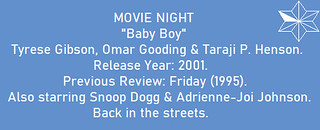Cast:
Tyrese Gibson (Joseph "Jody" Summers / Baby Boy), Omar Gooding (Sweetpea), Taraji P. Henson (Yvette), Snoop Dogg (Rodney), Adrienne-Joi Johnson (Juanita), Ving Rhames (Melvin), Mo'Nique (Patrice), Angell Conwell (Kim), Tamara LaSeon Bass (Peanut), and Candy Ann Brown (Ms. Herron) Written, Directed, and Produced by John Singleton (#545 - Shaft (2000) and #1640 - Boyz n the Hood)
Review:
John Singleton had a vision to tell stories for black audiences, and he did what he could with the nine movies he made in twenty years. Granted, Boyz n the Hood (1991) always will be mentioned first in the discussion, but one can't really forget about the films he made besides that one when it comes to depicting the experience on the street. After the success of the film, he directed four films in the next seven years: Poetic Justice (1993), Higher Learning (1995), Rosewood (1997), and Shaft (2000), which resulted in varying levels of appreciation (he wrote/produced all but one of them). Incidentally, this was the motion picture debut of Tyrese Gibson, a Los Angeles native who started in music in 1998 after receiving notice in acting within advertisements and roles on TV. Singleton wants to make his point about it clear from the opening, which takes an observation from Frances Cress Welsing involving the infantilization of the "black man in America", one that refers to how folks would use "crib" to describe their home to go along with imagery depicting a birth that sets the tone early for a movie that basks in authenticity.
Admittedly, the movie does fine with what it wants to say about masculinity within a 130-minute run-time that squeezes just about as much as one could expect from a movie with a perspective that really could be said about anyone: there is a time to play and there is just a time to grow up. In other words: point a finger at oneself before trying to point it at others for one's situation, particularly ones self-created. One has seen self-determination in plenty of movies before, but one is interested to see it play out here with Singleton seemingly reacting to his previous film spent in the neighborhood with an older and wiser perspective (ten years, if you will). Gibson carries the film and the plight that comes with trying to have life both ways between man and "baby boy" with a natural style that generates curiosity in the dilemma presented without being used as a tool for easy blame. Henson proves to be a compelling match with Gibson in terms of gripping charm and interest that threads the needle of the determination angle with that waver in passion in trying to build the edges of a defined family. Snoop Dogg was not too unfamiliar with film, as he had appeared in a handful of roles over the past decade before release while being more known as a rapping icon. At any rate, he does well with a menacing role that comes into focus after everyone else has been introduced and makes the most of it. True, Gibson is interesting as the star. But honestly the highlight is Rhames, who practically steals the show away with his charisma that glows in well-meaning care that has engaging chemistry with Johnson. Each shows the presence of weary folks who only hope to see at least one youth spring from their parental nest without having to rip them out the hard way. Gooding provides the withered edge of a man trying to find redemption that pairs nicely with Gibson. By the time the film maneuvers itself towards resolution, it generally has managed to stick the landing points in confrontation (of course, one can see where the film touches on some of the same beats as Boyz n the Hood, particularly with having climatic decisions with two adults featuring a wordless conversation). It sometimes veers a bit in repetition, but it never dulls the senses with cheap tricks or moments that take you away from its neighborhood. The film was a fair hit on release, making $30 million on release (on a $16 million budget); two decades later, one can still see where the appeal still lies when it comes to this film, because it deserves a proper following with the success it manages to have by the efforts of a director rooted firmly in telling a story for black Americans to engage firmly with.
Overall, I give it 8 out of 10 stars.
Next Time: Black History Month ends with Summer of Soul (2021).


No comments:
Post a Comment